
   Japan
Import Cargo Security - Info Box Japan
Import Cargo Security - Info Box
Note:
Brainetta Ltd. expressly disclaims all warranties, expressed
or implied, as to the accuracy of any the contents provided
herein that are solely based on our understanding on issues
as referenced, or as to the fitness of the information for
any purpose.
 About This Info Box .....
Our Editor"s View
About This Info Box .....
Our Editor"s View 
 Links
On Japan Import Cargo Security On Maritime Container
Links
On Japan Import Cargo Security On Maritime Container

JP24
Info Summary @ BAL'S Portal


|
 Latest News and Information
Latest News and Information    |
| Date
|
Info
Source
|
Contents |
| |
|
|
| |
|
|
| |
|
|
| |
|
|
| |
|
|
| |
|
|
| |
|
|
| |
|
|
| |
|
|
| |
|
|
| |
|
|
| |
|
|
| |
|
|
| |
|
|
| |
|
|
| |
|
|
| |
|
|
| |
|
|
| |
|
|
| |
|
|
| |
|
|
| |
|
|
| |
|
|
| |
|
|
| |
|
|
<
| |
|
|
| |
|
|
|
|  March 18, 2013
March 18, 2013
NACCS
Assigns Service Provider To Assist Filers
for ID Application
  Starts
On April 1, 2013 Starts
On April 1, 2013 |

To
strengthen cooperation with service
providers concluded the agreement
with NACCS Center, and to contribute
to customer acquisition of individual
service provider, proxy application
process. For further detamils, please
visit NACCS webstie for Advance Filing
Rules. 
(Source:
NACCS Website 2013-3-18
|
|
|
|  March 1, 2013
March 1, 2013
NACCS
Readies Its AFR
(JP24) Web
Portal Detailing More Information
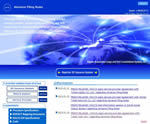 
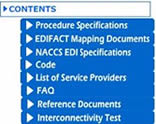
This
is the place where a variety of
relevant information about JP24
are available by NACCS. For English
readers outside Japan can have
an easy access to necessary details
on the coming implementation in
terms of Procedure. EDI Mapping,
Code, Service Provider, FAQ etc.
Please bookmark and visit this
portal site so as to make your
information updated for the security
filing fules of Japan. NACCS defines
its purpose of this portal site
to read;
"The
purpose of this website is to
provide obliged filers information
on using NACCS to report maritime
container cargo information to
Japan Customs based on Advance
Filing Rules*.
Please
visit this NACCS website where
you may find more information
in English 
(Source:
NACCS Website 2013-3-1
|
|
|
|  February 19, 2013
February 19, 2013
(Source:
Descartes Systems Group website
2012-2-19
|
|
|
|  December
28, 2012
December
28, 2012
For
the first time, Japan Customs and Tariff
Bureau(CTB) has released a PDF document
to cover key issues and relevant questions
on the JP24 Rules/Regulations in a from
of Frequently Asked Questions (FAQ).
This document has 38-questions and answers.
JAPAN
CUSTOMS RELEASED ITS
FIRST "FAQ"
DOCUMENT

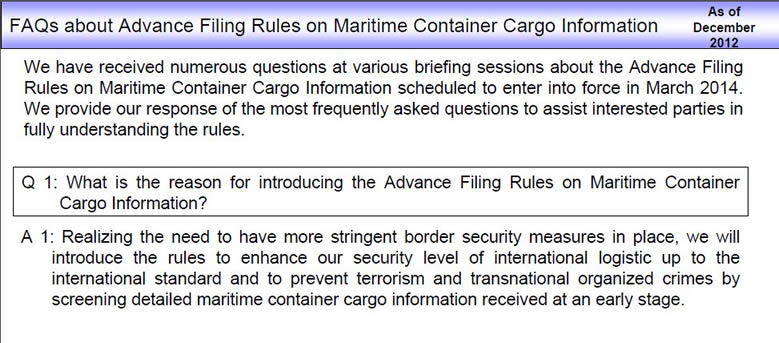
|
(Source:
Japan Customs website 2012-12-28
|
|
|
|  November
30, 2012
November
30, 2012
The Descartes Systems Group Signs with NACCS
A First JP24 "SERVICE PROVIDER"
AGREEMENT
NACCS
SIGNS FIRST SERVICE PROVIDER AGREEMENT
WITH 'The Descartes Systems Group
Inc.'
REGARDING ADVANCE FILING RULES

Kawasaki, Japan-
30 November 2012- Nippon Automated
Cargo and Port Consolidated System,
Inc. (NACCS Center) has signed
the agreement with Service Provider
‘The Descartes Systems Group
Inc.’ (Waterloo, Canada)
on connecting each other’s
system to enable Carriers and
NVOCCs in foreign countries, the
filers of newly implemented Japan’s
Advance Filing Rules, to report
electronically through NACCS to
Japan Customs as details shown
in the attachment.
This is the first time NACCS Center
signed the agreement on system
connection with service providers
regarding Advance Filing Rules.
*Advance
Filing Rules: On March 30, 2012,
a bill to amend part of the Customs
Law passed through the Diet in Japan.
This amendment enacts the Advance
Filing Rules, which require a vessel
operator or a NVOCC to electronically
submit information on maritime container
cargoes to be loaded on a vessel
intended to entry into a port in
Japan, to Japan Customs in principle
no later than 24 hours before departure
of the vessel from a port of loading.
The electronic report from foreign
filers will be made through service
providers authorized by NACCS Center.
(Source:
NACCS and Descartes Joint Press Release
made on 2012-11-30
|
|
|
|
 October
17, 2012
October
17, 2012
A list of descriptions and format requirements
that allow the Advance Filing Rules (JP24)
data element
NACCS
has released an English version of techincal
documents at the website which you can
download relevant PDF files as required.
Please
visit at http://www.naccscenter.com/keijiban/sea/common/etcdoc/etcdoc11e.html
where a table below leads you to the file
as required.
 How to read guidebook is available here.
How to read guidebook is available here.

(Source:
CTB and NACCS website 2012-10-17)
|
|
|
|
|
 October
12, 2012
October
12, 2012
A summary and details of JP24 system are
officially released by Cutoms Tariff Bureau
and NACCS
 JP24 Latest Update as of October 12, 2012
JP24 Latest Update as of October 12, 2012
(CTB
On JP24 System - An Overview and Details
Now Available for English Readers)
 CTB
(Customs Tariff Bureau) and NACCS (Nippon
Automated Cargo and Port Consolidated
System Inc.) have posted a set of official
English documents of the JP24 program
scheduled to be enforced in March 2014.
This is an English version of the nationwide
presentation equivalent (in hardcopy
document) that was made in Japan to
the local trade community in the month
of Sepbtember. NACCS's system implementation
details in English are in a final stage
of documentation work including the
data elements specificcations which
may readily be available soon. CTB
(Customs Tariff Bureau) and NACCS (Nippon
Automated Cargo and Port Consolidated
System Inc.) have posted a set of official
English documents of the JP24 program
scheduled to be enforced in March 2014.
This is an English version of the nationwide
presentation equivalent (in hardcopy
document) that was made in Japan to
the local trade community in the month
of Sepbtember. NACCS's system implementation
details in English are in a final stage
of documentation work including the
data elements specificcations which
may readily be available soon.
Please
click to go to Customs Tariff Bureau
(Customs) site for details. 
On March 30, 2012, a bill to
amend part of the Customs Tariff
Law and relevant laws has passed
through the Diet. This amendment
enacts the Advance Filing Rules,
which require a vessel operator
or a NVOCC to electronically
submit to the Customs information
on maritime container cargoes
to be loaded on a vessel intended
to entry into a port in Japan,
in principle no later than 24
hours before departure of the
vessel from a port of loading.
The Rules will be implemented
in March 2014.
(Issues
on the table by CTB)
-
Summary of the Advance Filing
Rules on Maritime Container Cargo
Information
- Relaxed application to the deadline
for filing
- Data elements of the Advance
Filing Rules on Maritime Container
Cargo Information
- Advance Notice of the Result
of Risk Analysis
- User Connectivity in Advance
Filing Rules on Maritime Container
Cargo Information
- Business Process Flow under
the Advance Filing Rules on Maritime
Container Cargo Information
|
(NACCS
On Service Provider)
 NACCS
is reportedly
now in an initiating processof
working with those candidates
of Service Providers (SP)
who expressed their intentions
to participate in the JP24 program.
BAL understands that
NACCS is talking with such parties
on individual basis to prepare
and pave its way to officially
announce to the trade who will
be ready to perform SP function
in the JP24. We expect that
a list of SPs authorized by
NACCS may be available sometime
by the end of this year or maybe
a little earlier.
NACCS
is reportedly
now in an initiating processof
working with those candidates
of Service Providers (SP)
who expressed their intentions
to participate in the JP24 program.
BAL understands that
NACCS is talking with such parties
on individual basis to prepare
and pave its way to officially
announce to the trade who will
be ready to perform SP function
in the JP24. We expect that
a list of SPs authorized by
NACCS may be available sometime
by the end of this year or maybe
a little earlier.
Please
click to go to NACCS site 
For
inquiries to NACCS :
NACCS Center Planning &
Research Division III
Phone:+81-44-520-6278,
Fax:+81-44-520-6247
E-mail: afr-c@naccs.jp
|
(Issues
on the table by NACCS)
Reference
Data
Reference Materials for
Service Providers
Information
for SP on Advance Filing
Rules
The Summary of the Advance
Filing Rules on Cargo
InformationIn March 2012,
a bill to enact the Advance
Filing Rules passed the
Diet and the rules will
be implemented in March
2014. Since the rules
require overseas filers
to use NACCCS to file
their maritime container
cargo information electronically,
NACCS Center is starting
a new service to to enable
overseas filers to file
cargo information through
service providers.
List
of service providers
Service providers authorised
by NACCS center will be
updated on the list.
|
|
(Two Key Documents by
Customs Tariff Bureau
and NACCS)
|
(Source:
CTB and NACCS website edited by BAL
Editor 2012-10-13)
|
|
|
|
|
 September
13, 2012
September
13, 2012
A summary and details of JP24 system are
officially released by Cutoms Tariff Bureau
and NACCS
BAL
has attended the two official presentations
hosted by CTB (Customs Tariff Bureau)
and NACCS (Nippon Automated Cargo and
Port) on JP24 where several official
documents were made available. The audience
includes a variety of people from the
Japan trade community where shippers
as well as carriers and NVOCC have participated.
 JP24 Latest Update (Septembert 13,
2012)
JP24 Latest Update (Septembert 13,
2012)
(On
JP24 System Project)
CTB (Customs Tariff Bureau) and
NACCS (Nippon Automated Cargo and
Port Consolidated System Inc.) have
jointly hosted an official presentation
of the JP24 program to the Japan
local trade community with more
system specifics
for the very first time. This presentation
continues to be made at the 15-locations
across Japan. The first event opened
from Yokohama Customs on September
10th which is followed by Tokyo
Customs on September 11th. All events
will be completed by the last session
at Okinawa Customs on September
20th.
(On
Service Provider)
NACCS had a special information
session to focus on Service Providers
(SP) before starting its official
contact and invitation to individual
SP candidates
in October. About
30 people attended this gathering
held at NACCS Center which includes
such parties from SPs, software
developers and trade institutions
as JIFFA. It addressed three issues;
a. an executive summary of the new
rules, b. business and system flow,
c. operational specifications. This
event was arranged in Japanese language
only while NACCS will soon release
its official English documents sometime
soon that will be posted at its
English website.
(Note:
All English document will be posted
on this site after NACCS releases its
official PDFs in English)
(Source:
BAL Editor 2012-8-21)
|
|
|
|
|
 August
21, 2012
August
21, 2012
IJapan Customs has now set a nationwide
outreach program to local users in Japan
from Sept. 10, '12
Japan
Customs will have a nationwide outreach
program on JP24 to the trade community
starting on Sept. 10 in Tokyo Customs.
It is followed by the regional 15-Customs
offices in such locations from Hakodate
in the north to Okinawa in the south including
Yokohama, Nagoya, Osaka, Kobe and Hakata.
The program is to address;
a. an executive summary of the new rules,
b. business and system flow,
c. operational specifications.
This program will be arranged in Japanese
language only.
 Direct
link to Tokyo Customs website.
(in Japanese language) Direct
link to Tokyo Customs website.
(in Japanese language)

 Direct
link to Japan Customs on 15-locations
where JP24 outreach program explained.
(in Japanese language) Direct
link to Japan Customs on 15-locations
where JP24 outreach program explained.
(in Japanese language)

(Source:
Tokyo Customs web site 2012-8-21)
|
|
|
|
|
 August
21, 2012
August
21, 2012
NACCS Is Holding An Information Session
Specically Focused On Service Providers
(SP) On the Advance Filing Rules
NACCS
(Nippon Automated Cargo and Port Consolidated
System Inc.) being the JP24 system implementation
semi-governmental body, has announced
and set its date on a special venue in
mid-Setptember. It is to explain the new
NACCS system concept and to encourage
possible participations by Service Provoders
(SP)
in the program to meet the JP24 rules
and regulations. This gathering is specifically
dedicated for SPs only where such agenda
as 1. Overview of the Advance Filing Rules,
2. Business Process Flow, 3. Business
Specification, 4. Contract Between NACCS
Center and Service Providers are to be
covered.
The following is an extract from the NACCS
announcement.
-
- - - - - - - - - - - - - - - - - - -
- - - - - - - - - - - - - - - - - - -
- - - - - - - - -
August
21, 2012
Information Session for Service Providers
on the Advance Filing Rules
In March 2012,
a bill to enact the Advance Filing Rules1
passed the Diet and the rules will be
implemented in March 2014.
Since the rules require overseas filers
to use NACCS to file their maritime container
cargo information electronically, NACCS
Center is starting a new service to enable
overseas filers to file cargo information
through service providers.
In order to explain about this new service,
we will be holding an information session
as described below for service providers
interested in connecting with NACCS.
Please fill in the application form (attached)
and send it back by return e-mail by 5th
of September at 5 PM (Japan Standard Time)
to attend the information session. Due
to the limited capacity of the venue,
participation may be subject to availability.
Please RSVP as soon as possible.
Date: September
13, 2012
Time: 14:00-(Japan Standard Time)
Location: Solid Square West Tower 1st
Fl. 580 Horikawa-cho, Saiwai-ku,
Kawasaki city, Kanagawa 212-0013 Japan
Agenda:
1. Overview of the Advance Filing Rules
2. Business Process Flow
3. Business Specification
4. Contract Between NACCS Center and Service
Providers
 For
your easy reference: NACCS Annoucement,
Application Form for SP, Meeting Location
For
your easy reference: NACCS Annoucement,
Application Form for SP, Meeting Location

 Direct
link to NACCS website of its New Release. Direct
link to NACCS website of its New Release.

(Source:
NACCS web sites)
|
|
|
|
|
 Aug.
1, 2012
Aug.
1, 2012
Custom Tariff Bureau has completed its legal
process on July 31, 2012
The
Customs Tariff Bureau (CTB) has completed
its legal process of the JP24 relevant
rules and regulations by publishing
through the government official gazette
on July 31, 2012. No English version
is available. This completion of legal
process has now paved the legal foundation
to have JP24 be implemented and enforced
which is scheduled in March 2014.

 (In
Japanese) (In
Japanese)

 Direct
link to The Japan Customs' website. Direct
link to The Japan Customs' website. 
 For
your easy reference,
For
your easy reference,
The English version
of JP24Summary is available in
One
PDF by
the BAL Editor. Please click here for
easy download. 
(Source:
Japan Government Official Gazette 2012-7-31)
|
|
|
|
 Jul.
20, 2012
Jul.
20, 2012
"User Connectivity" and "Business
Process Flow" now added
The
Customs Tariff Bureau (CTB) has released
two new documents covering the issues
of "User Connectivity" and "Business
Process Flow" which are to be added
to the previously announced ones on "Summary/Data
Elements/Filing Deadline". Relevant
PDF files in English can be downloaded
to global users in the trade community.

 Direct
link to The Japan Customs' website. Direct
link to The Japan Customs' website. 
 For
your easy reference,
For
your easy reference,
The above 5(Five)
PDFs are combined into One
PDF by
the BAL Editor. Please click here for
easy download. 
(Source:
Japan Customs 2012-7-20)
|
|
|
|
|  May
23, 2012
May
23, 2012
Customs and Tariff Bureau (CTB) has officially
announced of the new cargo security law
i.e. "Advance Filing Rules"
A
direct link to The Japan Customs' website,
please 
For
your easy reference,
the above three PDFs are combined into
one PDF
by the BAL Editor. Please click here for
download. 
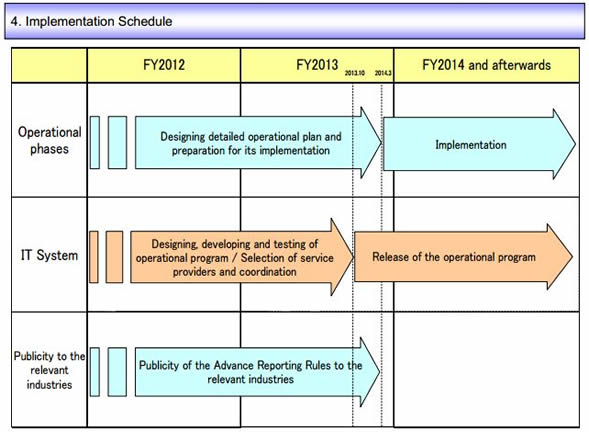
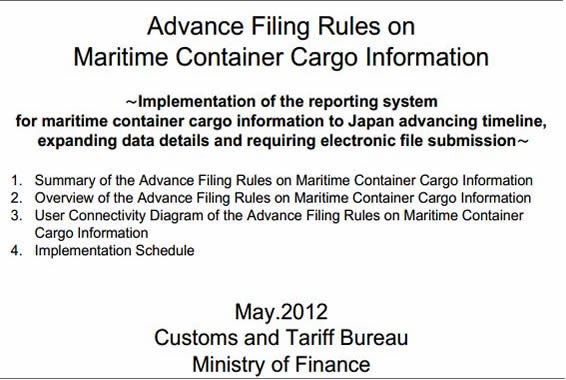
(Source:
Japan Customs Website)
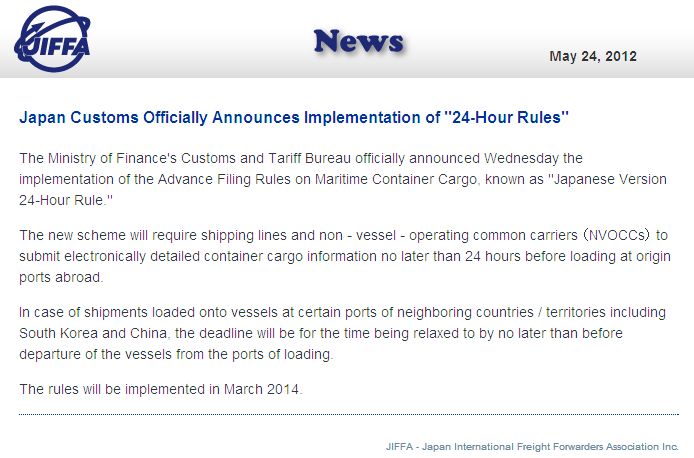
(Source:
JIFFA Website)
|
|
|
|
 May
1, 2012
May
1, 2012
The Statement On Global Supply Chain Security
Specifically Manifests "Advance Filing
Rules" i.e. JP24 Legistlation

The
U.S.-Japan Alliance is the cornerstone
of peace, security, and stability in the
Asia-Pacific region. This partnership
has underwritten the dynamic growth and
prosperity of the region for 60 years.
The strength of this Alliance, which was
demonstrated during the Great East Japan
Earthquake of 2011, is founded on the
close bonds between our two nations and
our people. These bonds will continue
to anchor and sustain our partnership.
...........................................
-
- - - - - - - - - - - - - - - - - - -
- - - - - - - - - - - - - - - - - - -
- - - - - - - - -

As
long-time allies and major trading partners,
with significant vested interests in the
secure and efficient flow of goods, the
United States and Japan share an appreciation
for the disruptive threats posed by terrorism
and natural disasters on the global supply
chain. ......................................
3)
Enhance information exchange between the
two countries regarding advance cargo
information, taking into account Japan’s
legislation on Advance Filing Rules on
Maritime Container Cargo Information (the
24-Hour Rule);
A full text of GLOBAL SUPPLY
CHAIN SECURITY in the U.S.-Japan
Joint Statement (Documents available
in English & Japanese at MOFA website
are combined into one PDF file by BAL-Editor)

(Source:
Government web sites of U.S. and Japan)
|

GLOBAL
SUPPLY CHAIN SECURITY
( English & Japanese)


|
|
|
|
 March
30, 2012
March
30, 2012
The Japan 24 Hour Legislation Has Been Completed
On Thursday March 29, 2012
 The
Japan 24 Hour legislation has been completed
on Thursday March 29 at the Upper House
During the 180th Diet Session. The Lower
House has Made the same of its approval
of JP24 just a week ago on March 23. This
situaion now sets a stage for CTB/NACCS
to pave its way off Implementing/Enforcing
this new aw within 2-Years time as promulgated. The
Japan 24 Hour legislation has been completed
on Thursday March 29 at the Upper House
During the 180th Diet Session. The Lower
House has Made the same of its approval
of JP24 just a week ago on March 23. This
situaion now sets a stage for CTB/NACCS
to pave its way off Implementing/Enforcing
this new aw within 2-Years time as promulgated.
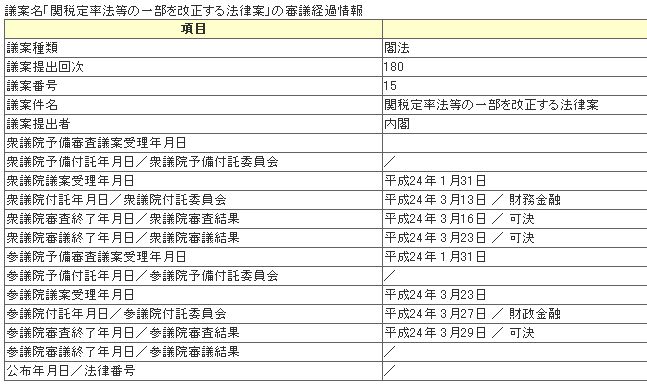
(Source:
The Upper House Website)
|
|
|
|
|
 Feb.1,
2012
Feb.1,
2012
MOF Unveils Comments from General Public
on Proposed ''24-Hour Rule''
Japan's Ministry of Finance
(MOF) recently unveiled the comments it
had solicited from the general public
in respect to introducing the so-called
''24-Hour Rule'' in Japan.
The 24-Hour Rule is a system under which
detailed information on seaborne import
containers are submitted as early as possible
in a computerized format
The ministry invited comments from the
general public on Nov. 9-30, 2011, during
which time 222 views were submitted by
112 individuals.
According to the proposal made by the
MOF's Customs and Tariff Bureau (CTB),
when the 24-Hour Rule is in force in Japan,
the operators of oceangoing ships destined
to Japan (shipping companies) and cargo
senders (non-vessel-operating common carriers,
or NVOCCs) will be required to send information
on containerized shipments with which
mainline vessels are loaded to the customs
houses of destination ports via the Nippon
Automated Cargo Clearance System (NACCS)
at lease 24 hours in advance to when the
ships leave foreign ports.
As for the deadline for reporting cargo
information (manifests), some of the comments
made by the general public insisted on
12 hours or less for shortsea containers.
In reply to them, the CTB said it will
take actual logistics situations into
consideration as much as possible, but
did not indicate a specific timeframe.
Others suggested that exceptions be made,
including allowing exporters and imports
that are certified as Authorized Economic
Operators (AEOs) to present manifest data
some time before mainline vessels arrive
in Japan.
Regarding this suggestion, the CTB indicated
it will continue to hold discussions with
relevant parties, but did not say anything
more than that.
As for sending detailed information on
containers, some wanted items they must
follow at the very least to be clarified.
In respect to this, the CTB stated that
presenting detailed cargo information
in advance means urging NVOCCs to submit
information contained in house bills of
lading (B/Ls).
(Source:
JIFFA News 2012-02-01)
|
|
|
|
|
 Jan.
26, 2012
Jan.
26, 2012
Customs and Tariff Bureau Released A Result
of Public Comment
Collected
Nov. 9-30, 2011 On "Japan 24 Hour Rule"
 
CTB
has released a result of Public Comment
that are collected during November 9-30,
2011 and it is now publised at the Government
Portal Site. Reference materials (in
Japanese language only) are available
for your access in PDF form. For readers
guidance, a total of 222 comments by 112
individuals are received by CTB. There
are two (2) views only out of the total
are somewhat expressed rather against
to this JP24 scheme in general or just
negative on this program.
The below document is a covering letter
by the CTB of this official notice.

The
public comments and CTB policy responses
in a summary form are available at the
e-Gov website. It is also downloadable
at this site although no English version
is available. Please click the right button

(in Japanese language
only)
(A
part of the summary page-1 is shown below
where Public Comment on the left and CTB
view on the right)
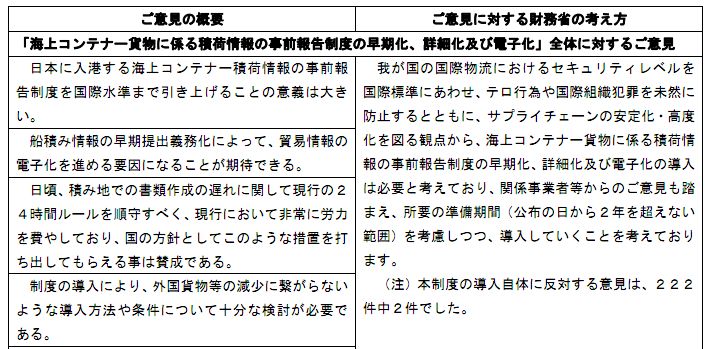
(By
BAL Editor )
|
|
|
|
|
 Dec.
8, 2011
Dec.
8, 2011
Shippers' Body Submits Comments to MOF on
24-Hour Rule in Japan

Japan
Foreign Trade Council, Inc. (JFTC) on
Nov. 30, 2011 submitted its opinions—on
behalf of shippers (trading houses)—to
the Ministry of Finance (MOF) on having
a system equivalent to the U.S. Customs
and Border Protection (CPB)'s 24-Hour
Advanced Vessel Manifest Rule (24-Hour
Rule) to be introduced in Japan.
The MOF accepted
opinions from the general public on its
draft on launching the system in Japan,
under which detailed information on seaborne
import containers bound for Japan can
be obtained early in a computerized format.
JFTC indicated
it is in favor of having the system introduced
and promoted in Japan, hoping that requiring
senders to submit data on cargoes before
mainline vessels are loaded with them
would facilitate trade information to
be processed in a computerized format.
''In the existing
customs-clearance system, the Nippon Automated
Cargo Clearance System (NACCS), freight
information is not fully disclosed to
shippers,'' added the industry group of
trading companies.
Therefore, it claimed
there are no an organic links between
customs-clearance instructions shippers
send to forwarders and cargo information
that forwarders obtain from the NACCS.
As such, the Tokyo-based
organization demanded the NACCS be altered
so that shippers could obtain cargo information
earlier to use it when sending instructions
to forwarders.
In addition, JFTC
suggested that an arrangement be made
when the system is implemented in Japan
so that information on cargoes from China,
Hong Kong, South Korea, Taiwan and other
neighboring economies in Asia would be
presented 12 hours—not 24 hours—in
advance to when vessels are loaded with
them at foreign ports.
(Source:
JIFFA News 2011-12-8)
|
|
|
|
|
 Nov.
25, 2011
Nov.
25, 2011
Finance Ministry (MOF) Set to Present Bill
for Japanese Version 24-Hour Rule
The
Japanese Ministry of Finance (MOF) recently
has worked out a daft for having a system
similar to the U.S.’s 24-Hour Rule
implemented in Japan as part of a reform
of the customs law for fiscal 2012.
The decision was
made during a meeting on Nov. 17, 2011
of the customs tariff sub-committee, which
is an organization under the ministry’s
Council on Customs, Tariff, Foreign Exchange
and Other Transaction. The MOF intends
to send the bill to the Diet around February
2012 so that it will be approved hopefully
in late March.
When a 24-hour
rule is introduced in Japan, it would
be necessary for consigners to submit
information on containerized shipments
they send to Japan.
More specifically,
shipping companies would be required to
file data on containers that is described
on master bills of lading (B/Ls) with
the customs offices at ports of destination
in Japan at lease 24 hours in advance
to when they left ports of origin.
Similarly, non-vessel-operating
common carriers (NVOCCs) would have to
submit cargo information on house B/Ls.
When containers
are imported to Japan by sea from nearby
countries, security of global standards
would have to be ensured, according to
the MOF, but the ministry added that it
would be very important to take reality
into consideration as much as possible.
Shipping lines,
NVOCCs and other parties would need to
submit information on containers electrically—through
the Sea-NACCS. However, if service providers
conclude contracts with the Sea-NACCS,
they would be authorized to send data
on behalf of senders.
When the new system
is implemented in Japan, customs directors
would be allowed to prohibit (stop) ships
from discharging containers at ports of
destination when necessary.
The system would
be launched two years after a new law
is promulgated. For example, if the Diet
approves the bill and officially announces
the approval in March 2012, the Japanese
version of the 24-Hour Rule would take
effect as early as the middle of 2014.
(Source:
JIFFA News 2011-11-25)
|
|
|
|
|
 Nov.
14, 2011
Nov.
14, 2011
Finance Ministry Unveils Draft for Japan’s
‘24-Hour Rule’
The
Customs and Tariff Bureau (CTB) of Japan’s
Ministry of Finance (MOF) recently has
unveiled a proposal for introducing a
system under which detailed information
on seaborne import containers can be obtained
as early as possible in a computerized
format.
The proposal was made when the tariff
sub-council—an organization under
the ministry’s Council on Customs,
Tariff, Foreign Exchange and Other Transaction—convened
a meeting on November 9.
The sub-council is scheduled to meet
again on November 25, intending to more
deeply discuss the proposal, which was
made in preparation for having a Japanese
version of the so-called 24-Hour Rule,
clarifying important points.
The MOF plans to come up with a final
draft in December for revising the Customs
Act after the sub-council’s proposal
is submitted to and examined by the council.
The CTB began accepting comments from
the general public on November 9 and will
continue to do so until November 30.
The proposal was made by the tariff sub-council
to alter the ongoing system for filing
cargo information in advance.
The outline is to require the operators
of foreign-trade vessels destined to Japan
(shipping companies) and cargo transporters
(non-vessel-operating common carriers,
or NVOCCs) to file information on containerized
shipments at lease 24 hours in advance
to when mainline vessels are loaded with
them at foreign ports.
Information on shipments should be submitted
in a computerized format—or through
the NACCS—to customs offices at
ports to which they are imported, according
to the outline.
The MOF hopes to launch the new system,
hopefully in two years from when a revision
on the Customs Act is implemented, or
around March 2014.
(Source:
JIFFA News 2011-11-14)
|
|
|
|
|
 Nov.
9, 2011
Nov.
9, 2011
Customs and Tariff Bureau Sets A Stage for
Public
Comment Nov.
9-30 On "Japan 24 Hour Rule"
 
CTB
has set a period of 20 days from November
9-30 for the Public Comment that was announced
at the Government Portal Site called e-Gov.
Reference materials (in Japanese language
only) are now available for public access
whilst most of such documents are already
listed in our info-box. For more information,
please contact;
- Case Number for Public Comment: 395107101
- Contact: Customs and Tariff
Bureau: Phone 03-3581-4111 (Ext5569
) FAX 03-5251-2155
If
your browser can handle Japanese characters,
the following e-Gov Page on JP24 may be
of your informaive assistance.
-
http://search.e-gov.go.jp/servlet/Public?CLASSNAME=Pcm1010&BID=395107101&OBJCD=&GROUP=
(by
BAL Editor)
|
|
|
|
|
 Nov.
9, 2011
Nov.
9, 2011
Customs and Tariff Bureau (CTB) Released
Document On Maritime Container of 24 Hour
Advanced Notice Rule
Customs
& Tariff Bureau (CTB) has released
today its official document which gives
more details on the JP24 Project. This
document is basically to repeat the WG
chariman report as explained in the previous
document explained on this website. JP24
data elements (which are to be confirmed
and finalized later) including the additional
17-items are now listed based on the WCO
SAFE Framework standards for Import Security.
There is also a summary chart (as below
in Japanese langauage) of overview illustrating
the business process of JP24 concept on
Import Cargo to Japan. According to some
reliable sources, CTB may soon announce
its "Request for Comments from Public"
that might allow several weeks to hear
such comments as available.
(by BAL Editor)
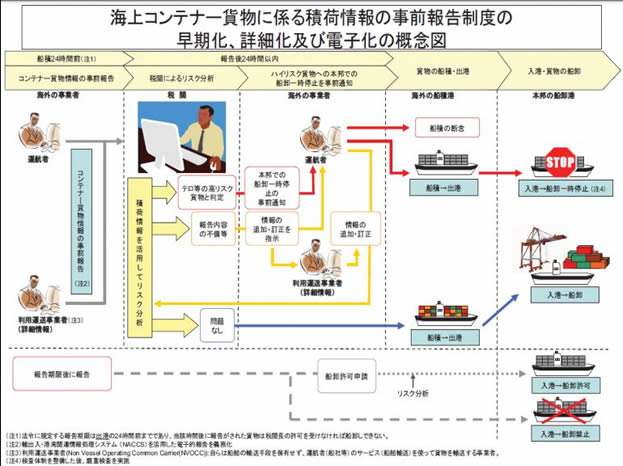
(from
Page 8 of Document 4-1) ... Explanatory
English notes may be added to this chart
later (BAL Editor)
|
|
|
|
|
 Oct.
27, 2011
Oct.
27, 2011
CTB WG Chairman Submitted His Policy Document
Defining Basic Rules On Import Cargo Security
(JP24)
 The
Special Advisory Council on Customs, Tariff,
Foreign Exchange of Ministry of Finance
(Customs & Tariff Bureau - CTB) was
convened on Monday October 25, 2011 and
has adopted a crucial policy paper that
was prepared by the Working Group chairman
on the strategic issues of how best to
manage and ensure “Trade Facilitation
and Cargo Security” in the global
supply chain or international logistics.
After the policy overview section on the
global trade scene and its critical role
of customs, this document in the item-3
has devoted several pages with more concrete
and specific details than before in terms
of Import Cargo Security agenda. The
Special Advisory Council on Customs, Tariff,
Foreign Exchange of Ministry of Finance
(Customs & Tariff Bureau - CTB) was
convened on Monday October 25, 2011 and
has adopted a crucial policy paper that
was prepared by the Working Group chairman
on the strategic issues of how best to
manage and ensure “Trade Facilitation
and Cargo Security” in the global
supply chain or international logistics.
After the policy overview section on the
global trade scene and its critical role
of customs, this document in the item-3
has devoted several pages with more concrete
and specific details than before in terms
of Import Cargo Security agenda.

In this chairman report, three general
policy challenges ahead are tabled that
must be addressed to by CTB i.e. (1) customs
paperless framework and platform, (2)
AEO with its effective and efficient use,
(3) import cargo security i.e. the so-called
24-hour rule in Japan.
In terms of JP24 or Import Cargo Security
in particular, this document is to cover
general issues as well as specific agenda
that include, for the very first time,
on CTB’s time table or roadmap for
an implementation of the new proposed
legislation. The below chart (prepared
by this Editor referring to the CTB original
chart) explains such time table while
the three keywords as already elaborated
in this info box are kept intact also
in the chairman paper, i.e. (1) advanced
cargo manifest before vessel loading at
foregin port, (2) import cargo details
must be reported by carrier as well as
NVOCC, i.e. master/house B/Ls, (3) electronic
filing becomes mandatory thereby eliminating
the current remaining paperwork in use.
In addition, a status of NVOCC with its
genuine carrier role and its responsibility
for e-filing their house B/L to customs
is more explicitly redefined. And also
an employment of "Service Provider"
scheme appears now well stated. These
ideas will, in respect of the advanced
cargo security operational arrangement,
surely open the door for direct e-filing
at loading side from overseas.
(by BAL Editor)
(CTB
Roadmap of JP24 Implementation)

Note:
The below chart is an original version
in Japanese language. Our added red
arrow indicates "Date of Enforcement".

The
following is BAL Editor’s free translation
of the CTB official document (Page 15-17)
in Japanese language as referred to the
above. Contents are limited to selected
relevant parts of Import Cargo Security
in the Item-3.
- - - - - - - -
- - - - - - - - - - - - - - - - - - -
- - - - - - - - - - - - -
|
(The
Original Document in Japanese language-
Page 15-17)
Item-3.
Import Cargo Manifest – Three
Keys To Secure Availabililty of
Information
1)
Advanced Cargo Manifest, 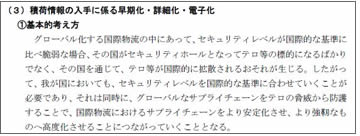
2) Cargo On Master & House
B/Ls,
3) Electronic Data Filing
(1)
Basic concepts and approaches
Under
the current global supply chain
management and international logistics
operation, if any country may
fail to protect required levels
of the international security
standards, it might inevitably
cause targets of terrorism by
leaving security holes uncovered.
As a result, it could invite proliferation
of terrorism that may spread over
around the globe. Therefore, Japan
must meet the level of international
security standards as required
which simultaneously protect the
global trade from the threats
of terrorism and enforces the
stabilization of international
trade system.
This
situation calls for one agenda
among customs organization of
every nation on how to carry out
the combined efforts to the challenges
on “Trade Facilitation and
Cargo Security” and manage
the international trade system.
In June 2005, the WCO Council
adopted the SAFE Framework of
Standards to Secure and Facilitate
Global Trade (SAFE Framework)
that would act as a deterrent
to international terrorism, secure
revenue collections and promote
trade facilitation worldwide.
To meet these challenges, United
States, EU and some other nations
have then focused on maritime
container cargo which may be used
to conceal terrorism-related materials
or weapons of mass destruction.
These countries implemented so-called
the 24-Hour Rule that was adopted
in December 2002 by U.S. for the
very first time. It requires cargo
information to be reported by
three keys, i.e. 1) advanced cargo
manifest before loading, 2) full
details of cargo onboard by Master
as well as House B/Ls, 3) reporting
be made electronically. These
are the efforts eventually to
strengthen the border protection
based on risk management by using
information available from the
trade.
In
the meantime, Japan Customs rules
today define the responsibility
of ship captain or its agent who
must make sure cargo manifest
report be available 24-hours before
vessel arrival at port of entry
by compiling Master B/Ls onboard
(hereafter called Master B/L).
In addition, Customs may, if so
deemed necessary, also request
consignees or its agent to report
their House B/Ls details issued
by NVOCC (hereafter called House
B/L). Such reports can be made
either electronical form or by
paper document.
In
the light of SAFE Framework including
the advanced cargo manifest before
vessel loading, the import practice
of Japan Customs today appears
needing some reviews so as to
enforce, protect and prevent our
borders from the international
terrorisim, smuggling of illegal
goods and social ills as applicable.
Some of reviews necessary on the
current practice are;
- Submission of cargo manifest
is made just before ship's arrival
- Container cargo with consolidations
appears missing some crucial details
- Some of Master B/L information
continues to be made in paper
instead of in electronic form
These
elements are calling for more
scrutiny and improvement of risk
management, operational method
and timing of report, CTB finds
that renewed administrative measures
and corresponding actions are
now necessary.
(2)
Measures to be taken
The
globalized supply-chain and international
logistics today makes a situation
very critical for Japan where
it needs to embrace the SAFE Framework
and meet its levels of the security
standards. In terms of the ocean
cargo manifest issues in particular,
it shouldl be made available prior
to vessel loading at foreign port.
This rule applies to both of shipping
company as well as NVOCC being
the party responsible for its
carrying cargo contents as contracted.
And
such contents of shipment information
should be made in more of details
submitted by electronic form as
compulsory. By these measures
with relevant cargo information
available, it makes CTB far easier,
more efficient and effective to
conduct its risk analysis.
In
the meantime, it may be necessary
and desirable for CTB to allow
about two years time to develop
systems and setup relevant arrangement
for implementation including its
outreach programs to the trade
as well as implications on risk
management.
In
addition, information relating
to air cargo shipment that is
currently made just before the
arrival to port of entry, the
attempted terrorist incidents
occurred in Yemen October 22,
2010 has caused rethinking on
the security of air cargo at a
variety of international forum
including WCO where measures are,
similar to sea cargo, to be taken
so as to obtain relevant information
well in advance.
(3)
Concrete and specific measures
1)
Advanced Cargo Manifest
-
To advance timing of report:
24-hour before vessel
departure at foreign port instead
of the current timing of vessel
arrival at Japan port
- To have some flextibility:
time allowance for Asian neighboring
countries be considered because
of its importance in Japan import
trade in terms of volume, traffic
and values
2)
Cargo On Master & House B/Ls
- To have more details on cargo:
commodity items (HS
6-digit), seal numbers, stopover
countries, information on senders/consignees
and other items to facilitate
and secure necessary examination
and analysis over potential
risks if any
- To ensure direct manifest
e-filing from overseas:
with an effective use of IT
technology including Internet,
cargo manifest be made from
overseas direct
- To consider Service Provider
employment: as
adopted in U.S. and others,
e-filings be made with a use
of such service provider who
is qualified to perform required
regulatory compliance filing
service.
3) Electronic Data Filing
-
To have manifest submission
by electronic form only:
Master and House B/L information
be filed using electronic method
as compulsory thereby making
the paper-oritented submission
by FAX or paper document be
no longer acceptable
- To facilitate risk management
by using Service Provider:
With a use of qualified professional
service as available, filers
can easily comply with the compulsory
electronic filing requirement.
- To promote e-business among
the trade indutry:
An advanced availability of
electronic import data at upstream
(at the time of vessel departure
from loading port), opens a
door for effecitve business
management solutions including
good cargo visibility among
relevant trading parties.
(Free Translation by BAL Editor)
|
|
|
|
|
|
 Oct.
27, 2011
Oct.
27, 2011
Ministry of Finance's Advisory Panel on
Customs Unveils Report on Japan's ''24-Hour
Rule''
Japan's
Ministry of Finance (MOF) recently unveiled
a summarized report on how Japan can pursue
its goal of facilitating trade and ensuring
security in international logistics at
the same time.
The
committee on tariffs—an organization
under the ministry’s Council on
Customs, Tariff, Foreign Exchange and
Other Transactions—met on Oct. 25,
2011, at which time the report was released.
It
is suggested in the report, which the
working group on trade facilitation—another
group located under the council—had
worked on since April, that Japan make
the following efforts to obtain detailed
information on seaborne import containers
as early as possible in a computerized
format, a challenge to overcome to launch
a Japanese version of the so-called 24-hour
rule.
The
report insists that in principle, cargo
information be submitted at least 24 hours
in advance to when vessels are loaded
with containers at foreign ports.
However,
in respect to imports from neighboring
countries, the report indicates that it
is desirable to be as flexible as possible
to reflect the actual realities of logistics,
while ensuring security of global levels.
To
obtain detailed cargo information, it
is necessary to refer to existing frameworks
and other countries, according to the
report.
It
is also important to have senders present,
among others, details of items, numbers
to define products (HS 6-digit), seal
numbers, stopover countries and information
on senders themselves and consignees (including
mailing addresses and telephone numbers),
as they can all be important factors when
risk levels are examined.
The
report also advises that it is necessary
to strive to have consigners submit not
only master bill-of-lading (B/L) information,
but also house B/L information in an electronic
format.
(Source:
JIFFA News 2011-10-27)
|
|
|
|
|
 Oct.
8, 2011
Oct.
8, 2011
CTB Document On Its Legislatiive Plans for
Fiscal 2012 including Import Cargo Security
Under
the guidance of Special Council on Customs,
Tariff, Foreign Exchange of Ministry of
Finance, the Customs Tariff Bureau (CTB)
has released three documents (in Japanese
only) at the recent committee meeting
held on 10/3/2011 of its basic policy
on key issues for the fiscal year of 2012
(April 2012-March 2013). These documents
comprehensively cover issues in general
as well as in specifics where “Import
Cargo Security” is also mentioned.
Document-1: 2012 Customs and Tariff Reform
– Overview and Latest Update
Document-2: Customs and Tariff Overview
– Agenda Relative To International
Issues
Document-3: 2012 Customs and Tariff Reform
Plan – Specifics including Import
Cargo Security
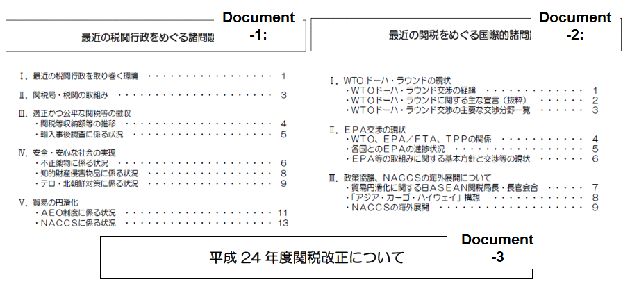
(Source:
CTB Website)
The
CTB Document-3 specifies a meeting schedule
by its Study Working Group as below that
is assigned to work out details on CTB
policy issues on the table for the coming
fiscal year of 2012 and make suggestions
and proposals on relevant rule-making
to the upper body i.e. Special Council
on Customs, Tariff and Foreign Exchange.
The “Import Cargo Security”
(JP24) issue is listed in Item-3-B with
the three keywords, i.e.
No.1 - Advanced manifest filing before
vessel loading at foreign port
No.2 - Master and House B/L cargo details
be submitted
No.3 - E-Filing is mandatory eliminating
paper submission
(Study
Working Group Meeting Schedule)
October 14 – First meeting,
October 25 – Second meeting,
Middle of November – Third meeting,
End of November – Closing session
for compiling issues for legislation
By the end of November 2011, it appears
that some kind of roadmap or JP24 schedule
of implementation may become available.
(by BAL Editor)
|
|
|
|
|
 Oct.
6, 2011
Oct.
6, 2011
Japan Working on Rule-making for '24-Hour
Rule'
Japan's
Ministry of Finance (MOF) recently has
suggested that Japan's customs system
be upgraded to facilitate trade and enhance
crime control.
The
suggestion was made on Oct. 3, 2011 when
the ministry's Council on Customs, Tariff,
Foreign Exchange and Other Transaction
held a meeting of its customs sub-council
to discuss tariff reforms for fiscal 2012
(April 2012-March 2013).
During
the meeting, views were exchanged on how
detailed information on cargoes in containers
can be obtained at early times in computerized
formats, which is a challenge to overcome
before the so-called 24-hour rule is applied
in Japan (for incoming vessels to Japan).
It
was agreed to unveil specifics of a new
rule in consideration of discussions to
be held during October 25 and November
meetings of the sub-council, both of which
will be convened to follow up a direction
to be defined later this month by the
working group (WG) on trade facilitation,
another organization under the above-mentioned
council.
As
for the submission of information on containerized
shipments in advance (24 hours in advance
to cargo loading at an origin port), discussions
are held in accordance with the World
Customs Organization (WCO) 's guidelines
for the 24-hour rule.
When
the WG met in September, the Japanese
Shipowners' Association (JSA) offered
an opinion, demanding the new rule not
hinder its members' business activities.
On
behalf of the non-vessel-operating common
carrier (NVOCC) industry, Japan International
Freight Forwarders Association Inc. (JIFFA)
proposed that it should not be a unique
rule in Japan but a universal rule. It
added that, as seen in the United States
and some European nations, the system
should allow local business operators
at places of origin to conclude contracts
with service providers, through which
the business operators can submit cargo
information in advance for their clients.
(Source: Ocean Commerce
Ltd.)
|
|
|
|
|
 Sep.
5, 2011
Sep.
5, 2011
CTB released an official document on "Japan
Import Cargo Security Control"
The Customs and Tariff
Bureau (CTB), Ministry of Finance of Japan,
the governmental body in charge of all matters
relating to Customs administration and tariff
policy, has recently published its official
document on Japan Import Cargo Security
measures for the very first time. It is
a similar security program to the AMS 24
hour rules in U.S. or the same of ICS-ENS
in EU. (Note: we tentatively name this planned
security program in Japan as "JP24"
in this website). It is released after the
policy study group of CTB has reviewed a
draft on the new legislation program. Although
there are no specifics available relative
to its implementation details such as schedule
or timetable, however, this document may
become the basic policy guidance for the
business community in Japan as well as foreign
countries in terms of "Security Issues
On Cargo To Japan" in future.
THE THREE(3) KEY WORDS ADOPTED
No.1 - Advanced manifest filing before vessel
loading at foreign port
No.2 - Master and House B/L cargo details
be submitted
No.3 - E-Filing is mandatory instead of
paper i.e. a big change of the basic notion
today
OTHER
IMPORTANT ITEMS OBSERVED
(1)
The rule applies to "Container Cargo"
only but no breakbulk
(2) Flexible timebar with neighboring countries
such as China, Korea, Taiwan
(3) NACCS is the sole IT System entry to
Japan Customs
(4) Service provider function appears to
be employed

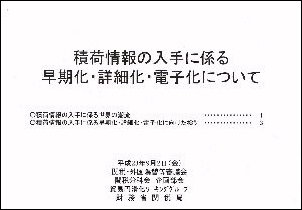
(The Issues
CTB Meeting of Sep.2, 2011 highlighted)
CTB, an equivalent
of CBP in U.S., in charge of matters relating
to Customs administration and tariff policy
under the Ministry of Finance, has convened
a policy committee meeting on JP24 and discussed/reviewed
a draft plan on the introduction of import
cargo security legislation. A number of
comments were made from the committee participants
particularly on the readiness by relevant
business community if they can embrace the
JP24 plan as outlined.
CTB confirmed to
continue its efforts having further hearings
and feedbacks from the business community
and its people before it completes the legislation
draft as planned. Just only after three
days of the 9/2 meeting, CTB has released
on its website the document that was used
at the committee for the very first time.
This document is available in Japanese language
only. Although there is no specific JP24
timetable available at this time, this document
becomes the policy guidance by CTB for a
possible implementation of JP24 programs
ahead. A final legislation draft may expectedly
be completed by CTB within the coming months.
In terms of our BAL's business opportunity
relative to Descartes Systems "Global
Filer" program, the CTB concept appears
more supportive since it does stipulate
a word "Service Provider" as an
acting third party who may be authorized
to perform "Filing" in the JP24
program.
(Source: BAL Editor)
Source:
CTB Official Docoment On The Basic Concept
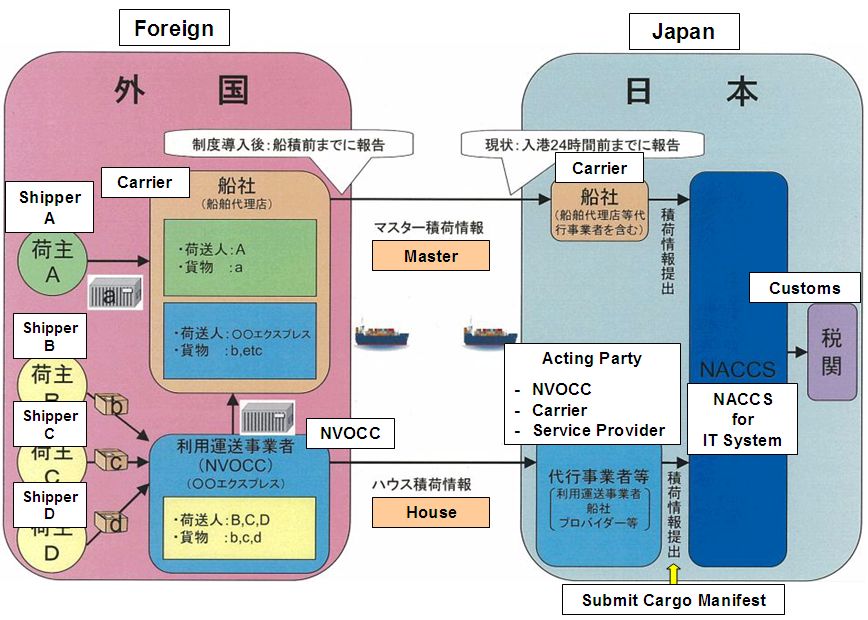
|
|
|
|
 Valuable
Links and Related Information On Japan Import Cargo
Security
Valuable
Links and Related Information On Japan Import Cargo
Security
| Name |
Website
URL |
| Ministry
of Finance |
|
| Japan
Customs |
|
| Japan
Customs Implementation of the Advance Filing
Rules on Maritime Container |
|
| NACCS
( English Entry Page) |
http://www.naccs.jp/e/index.html
|
| NACCS
- JP24 Issues |
http://www.naccs.jp/e/news/20120821.html
|
| JASTPRO
(Japan Association for Simplification of International
Trade Procedures) |
|
| JIFFA
(Japan International Freight Forwarders Association) |
|
| WCO(World
Customs Organization) |
|
| WCO
SAFE Package |
|
back-to-top
About Japan Import
Cargo Security Info Box
- - - - - - - - - - - - - - - - - - - -
- - - - - - - - - - - - - - - - - - - -
- - - - - - - - - - - - - - - - - - - -
- - - - - - - -
Official Document Published By Customs and
Tariff Bureau (CTB) - Sept. 2011
The Customs and Tariff Bureau (CTB), Ministry
of Finance of Japan, the governmental
body in charge of all matters relating
to Customs administration and tariff policy,
has recently published its official document
on Japan Import Cargo Security measures
for the very first time. It is
a similar security program to the AMS
24 hour rules in U.S. or the same of ICS-ENS
in EU.
(Note: we tentatively name
this planned security program in Japan
as "JP24"
in this website).
It is released after the policy study
group of CTB has reviewed a draft on the
new legislation program. Although there
are no specifics available relative to
its implementation
details such as schedule or timetable,
however, this document may become the
basic policy guidance for the business
community in Japan as well as foreign
countries.
In
the released report, CTB has adopted three
key words i.e. (1) advanced manifest filing
before vessel loading at foreign port,
(2) Master and House cargo details be
submitted, (3) e-filing is mandatory to
eliminate paper document. These elements
are extremely important and crucial to
those people and organizations in the
trade community overseas as well as in
Japan who are the key players for the
success of JP24 program.
Although
the CTB released document (written in
Japanese language) can be downloaded at
the CTB website, you can also read the
same PDF here at our site. Please click
here. 
(Sep.12,
2011 BAL Editor)
Note
from the Editor:
This website has been focusing on the “Cargo
Security” issues since many years after
the introduction of the 24-Hour Advanced Cargo
Manifest System was implemented by U.S. Customs
and Border Protection (CBP) in December 2002.
We have also reported the recent security
issues of ISF (10+2) by U.S. as well as the
program of ICS-ENS by EU Customs. To meet
with the need of our readers from Japan, we
setup a special column naming “Cargo
Security Info Box” in Japanese language,
but nothing similar has been arranged in English.
While the latest policy move by CTB on the
Japan Import Cargo Security may invite more
interest of readers outside Japan, our website
now starts English pages so as to report news
and information in the “Japan Cargo
Security Info Box” section. (9/12/2011) |
|
|
|

Browser
Does It All
|
|
| |
|
|
| |
|
|
| |
|
|
| |
|
|
| |
|
|
| |
| |

|